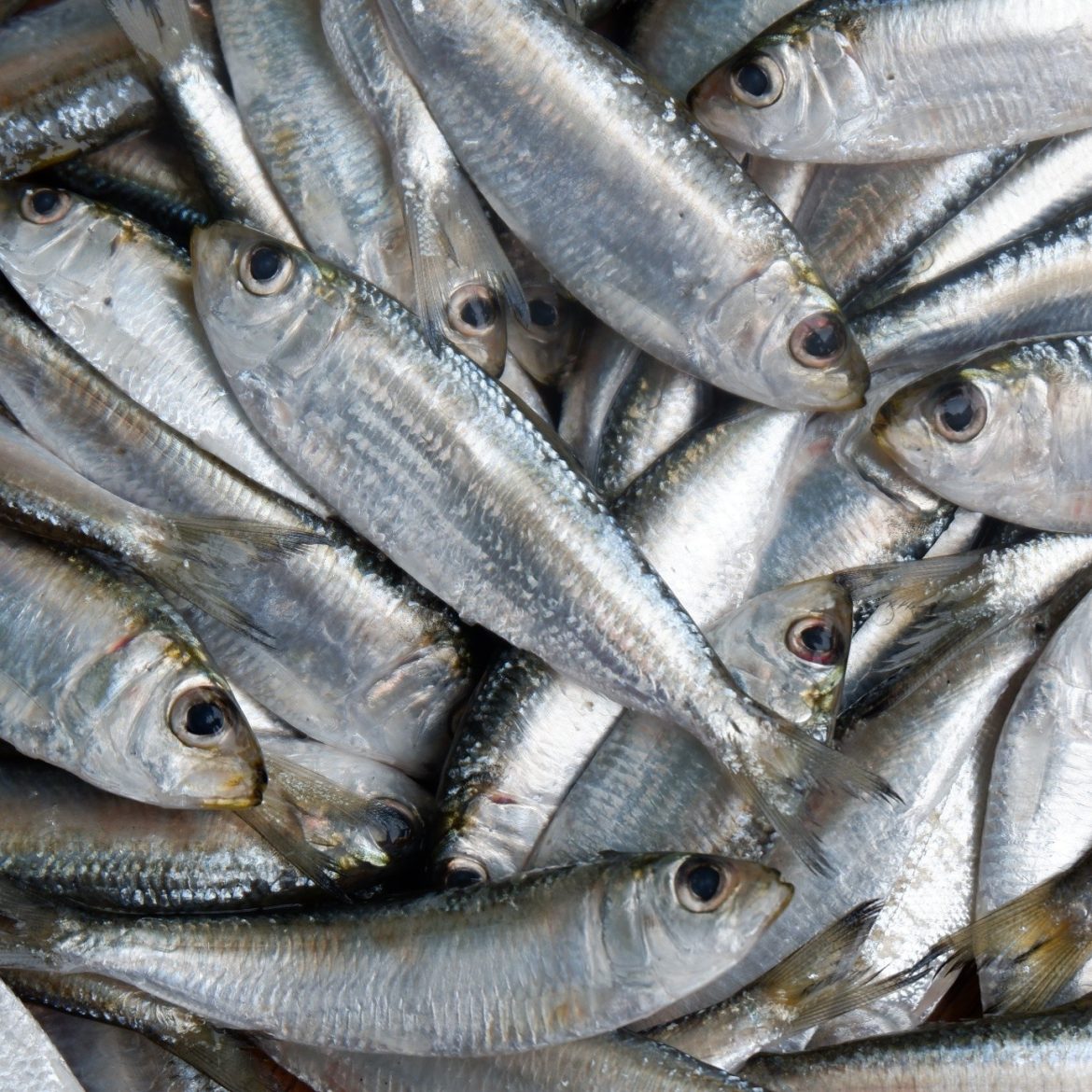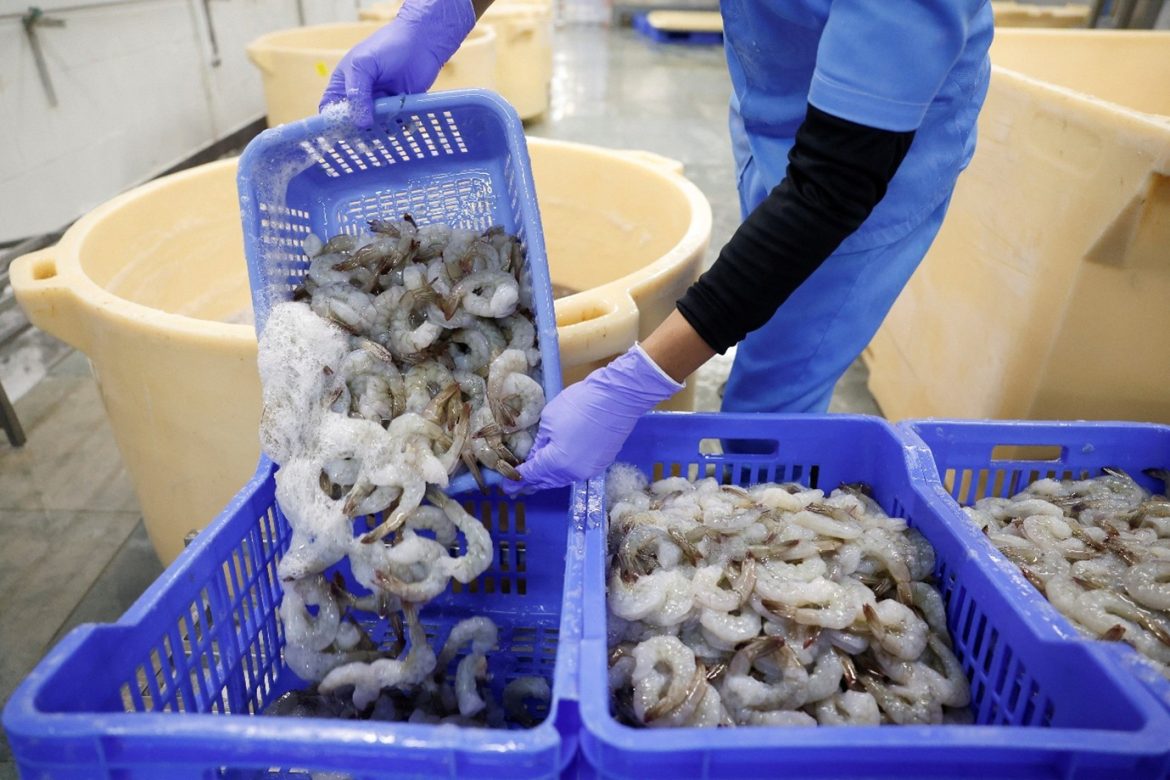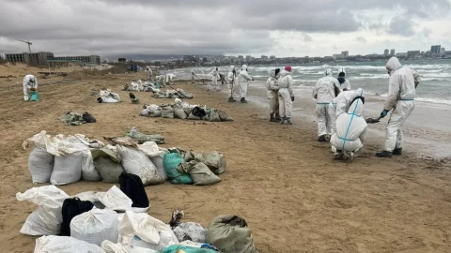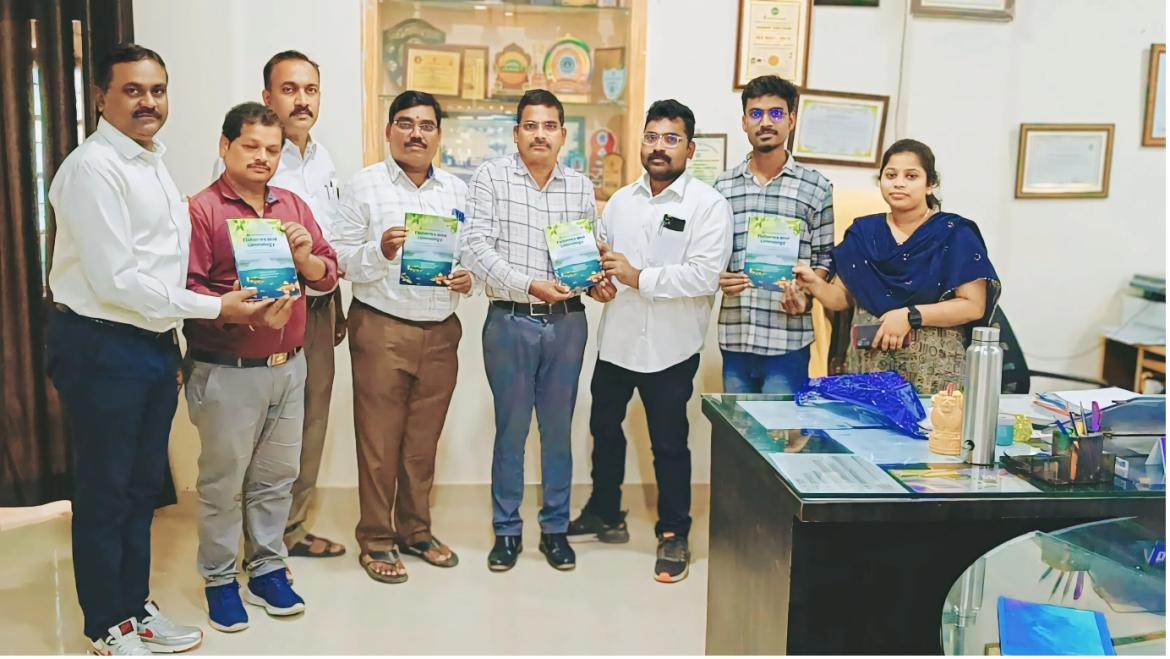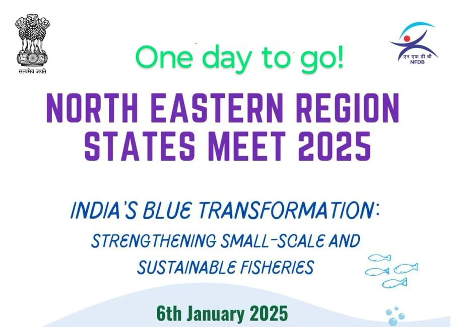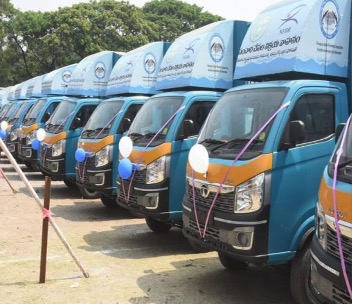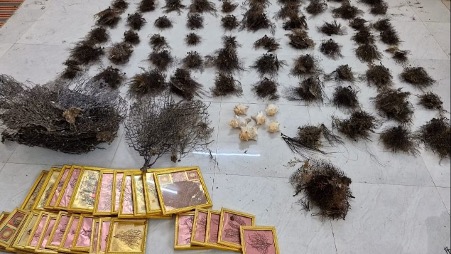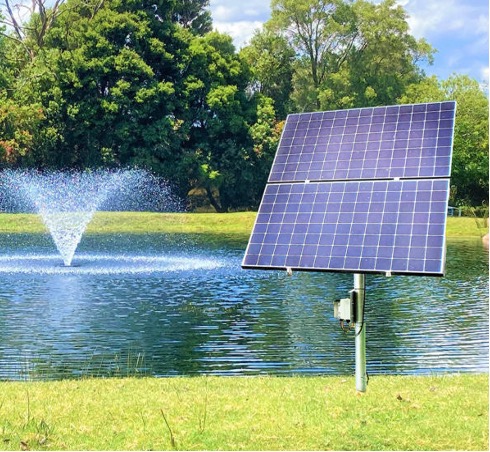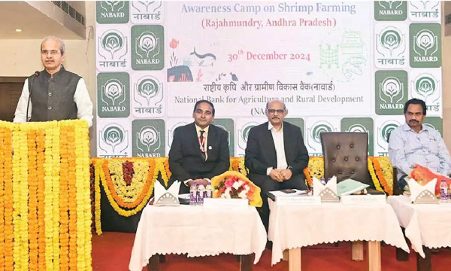Big news from Chennai!
Central Institute of Brackishwater Aquaculture CIBA(ICAR) scientists have successfully sequenced the genome of the goldlined seabream (Rhabdosargus sarba), popularly known as Matti Vaayan in Tamil Nadu.
What makes this fish special?
High Market Value – Its white meat is premium quality and preferred across India.
Farming Flexibility – Can grow in ponds, cages, and across varying salinity levels.
Golden Stripes, Golden Opportunity – It’s a perfect candidate to scale India’s brackishwater aquaculture.
With this first-ever genome sequencing, researchers now have a reference-level genetic blueprint — unlocking opportunities for:
Selective breeding
Broodstock improvement
Faster growth + disease resistance
Better sustainability in farming systems
This is not just a science win — it’s a leap forward for India’s Blue Economy vision.
Kudos to Dr. M.S. Shekhar and the team at ICAR-CIBA for this breakthrough
News
𝗣𝗵𝗶𝗹𝗶𝗽𝗽𝗶𝗻𝗲𝘀’ 𝗕𝗼𝗹𝗱 𝗠𝗼𝘃𝗲 𝘁𝗼 𝗕𝗿𝗲𝗲𝗱 𝗦𝗮𝗿𝗱𝗶𝗻𝗲𝘀 𝗶𝗻 𝗛𝗮𝘁𝗰𝗵𝗲𝗿𝗶𝗲𝘀 – 𝗪𝗵𝗮𝘁 𝗜𝗻𝗱𝗶𝗮 𝗖𝗮𝗻 𝗟𝗲𝗮𝗿𝗻.
In the Philippines, tamban (Bali sardinella) is everywhere — cheap, abundant, and a staple for millions. But wild stocks have been under pressure.
Now, for the first time ever, the Philippines has started captive breeding of tamban — and it’s not just an experiment. It’s a seven-year national project aiming to shift tamban from wild-caught to hatchery-bred.
Why This Matters
Tamban = 314,000+ tonnes in 2023, worth ₹2,000+ crore.
16.7% of all Philippine fish production is sardines.
Until now: zero hatchery-based production.
What’s Happening on the Ground
232 tamban broodstock now in Taal (Batangas) and Tigbauan (Iloilo).
Fish have survived 378+ days in captivity — a big breakthrough.
Feed studies show tamban love copepods, phyto & zooplankton.
Led by NFRDI Training Division with support from BFAR MIMAROPA Regional Office Region 9 and Aquaculture Department, Southeast Asian Fisheries Development Center (SEAFDEC)/AQD.
The 3-Phase Plan (2024–2030)
Biology & Domestication – underway.
Broodstock development & spawning trials – 2026 onward.
Grow-out culture for commercial scale – 2029–30.
What This Means for India
Could this model work for Indian small pelagics like lesser sardines or mackerel? We’ve seen big progress in marine hatcheries — maybe it’s time to look at volume species, not just high-value ones.
We’ll be watching this closely. If tamban farming works, it could change how the whole region thinks about sardines.
In a year filled with global tariff troubles, shrimp producers from Asia—including India, Vietnam, Thailand, and Indonesia—are shifting their focus away from traditional markets like China and the US. Why? Because these older markets are now full of high tariffs, demand drops, and strict rules.
Instead, exporters are eyeing Europe, Japan, and even Vietnam as new ‘safe’ markets for their shrimp. These countries offer stable prices, fewer trade restrictions, and growing demand—just what the struggling shrimp industry needs right now.
What’s Happening?
US & China markets now have heavy tariffs & tighter regulations.
EU & Japan are becoming top choices for shrimp trade due to reliability.
Indian exporters are already adapting with new strategies to enter these markets.
According to trade analysts, this change is helping stabilize profits for shrimp exporters and will reshape global seafood trade flows in the coming years.
What Indian Shrimp Businesses Should Do Now:
Get certified for EU/Japan standards (traceability, hygiene, etc.).
Use PMMSY and other government schemes to improve farm-to-export quality.
Focus on value-added shrimp products to stand out in global markets.
This is a golden chance for India’s aquaculture industry to lead the way globally. With smart planning and quick adaptation, our shrimp sector can bounce back stronger than ever.
A devastating fuel oil spill from two storm-damaged tankers has led to the deaths of 32 dolphins, according to an animal rescue group. The Delfa centre, based in Russia, reported the deaths of 61 cetaceans, with 32 “most likely” caused by the spill that occurred three weeks ago in the Kerch Strait, which separates the Russia-occupied Crimean Peninsula from southern Russia’s Krasnodar region.
The centre confirmed that the majority of the dolphins killed were “Azov” dolphins, a type of harbour porpoise closely related to belugas and narwhals. They noted that most of the cetaceans likely perished within the first 10 days following the disaster, judging by the condition of the bodies.
Cetaceans, including whales, dolphins, and porpoises, are vulnerable to such environmental catastrophes, and the oil spill has caused severe harm to marine life in the area.
In response to the crisis, Russia’s Emergencies Ministry announced that over 96,000 tons of contaminated sand and soil had been cleared from affected shorelines in the Krasnodar region. Meanwhile, officials in Crimea declared a regional emergency after oil traces were found on the shores of Sevastopol, the peninsula’s largest city, located about 250 kilometers (155 miles) from the Kerch Strait.
FISHERIES BOOKS LAUNCHED FOR FISHERY SCIENCE STUDENTS IN TELANGANA
“An introduction to Fisheries and Limnology” books for Fishery science students have been launched at the Government Arts and Science Autonomous College, Kamareddy. Under the guidance of the Department of Zoology and Fisheries, these books are tailored for degree and postgraduate students studying fishery sciences.
The book launch ceremony took place on Saturday and was presided over by the college Principal, Dr. K. Vijay Kumar. During the event, Dr. Kumar expressed his appreciation for the initiative, congratulating the Head of the Department of Zoology and Fisheries, T. Malsoor, along with faculty members Pawan Kumar and Manasa, for their dedicated efforts in bringing this project to fruition.
A remarkable addition to this year’s academic advancements was the introduction of an MSc Fisheries program at the college. Sharing his thoughts, T. Malsoor conveyed his happiness over this milestone. He said, “The MSc Fisheries program marks a new chapter for our institution. We are committed to working diligently in the field of research to empower MSc students, equipping them with the knowledge and skills required to excel in current research trends and compete at Universitie’s level”
- Malsoor further emphasized the importance of fostering a strong research culture among students and ensuring they have access to modern resources and innovative learning tools.
The Principal encouraged the entire team to maintain their momentum and continue striving to enhance academic and research opportunities for students. The event also saw the participation of Vice Principal Kishtayya and faculty members Vishwaprasad, Dinakaran, Ramulu, and others, who lauded the department’s efforts and pledged their support for future endeavors.
The launch of these books and the introduction of the MSc Fisheries program underscore the college’s commitment to academic excellence and its vision to nurture future leaders in the field of fisheries and research.
NORTHEASTERN REGION STATES MEET ON FISHERIES TO BE HELD IN GUWAHATI
The Department of Fisheries, under the Ministry of Fisheries, Animal Husbandry, and Dairying, is organizing the Northeastern Region States Meet today in Guwahati, Assam.
Union Minister Rajiv Ranjan Singh will chair the event, which will focus on reviewing the implementation of the Pradhan Mantri Matsya Sampada Yojana (PMMSY). Prominent ministers from the Northeast are set to participate in the meet.
As part of the program, fisheries development projects worth ₹50 crore will be inaugurated, signaling a significant boost for the sector in the region. Certificates and awards will also be distributed to fisheries beneficiaries. A noteworthy highlight is the announcement of an Organic Fisheries Cluster in Sikkim, aimed at promoting sustainable aquaculture.
A technical session led by ICAR Deputy Director General Dr. J.K. Jena will discuss challenges and advancements in fisheries and aquaculture, offering valuable insights for the stakeholders.
This meet is expected to strengthen sustainable fisheries practices, enhance productivity, and improve the livelihoods of fisher communities across the northeastern states.
PANCHAYAT RAJ MINISTER TO DISTRIBUTE MOBILE FISH RETAIL OUTLETS UNDER PMMSY
In a significant step towards empowering women and boosting fish consumption, Panchayat Raj and Rural Development Minister Danasari Anasuya (Seethakka) will inaugurated the distribution of Mobile Fish Retail Outlets (MFROs) sanctioned under the Pradhan Mantri Matsya Samrudhi Yojana (PMMSY) today and the Blue Revolution. The ceremony will take place at Praja Bhavan today.
Financial Support and Beneficiary Details:
The initiative, backed by the Indira Mahila Shakti programme, is facilitated by the Society for Elimination of Rural Poverty (SERP), which has arranged bank loans to cover the beneficiaries’ contribution.
- First Phase Allocation: 32 units (one per district) sanctioned.
- Unit Cost: ₹10.38 lakh, including fabrication.
- Subsidy: 60% per unit, amounting to ₹6 lakh.
Beneficiaries are Self-Help Group (SHG) women engaged in fish retail, selected by the District Fisheries Officer and District Rural Development Officer (DRDO) with approval from the respective District Collectors.
Features of Mobile Fish Retail Outlets:
Each unit is equipped for:
- Storage and sale of raw fish.
- Preparation and marketing of fish-based dishes.
- Operation in strategic locations like markets and public spaces.
Objective:
This initiative aims to:
- Empower Women: Provide sustainable income opportunities for SHG women.
- Promote Fish Consumption: Increase the accessibility and popularity of fish as a nutritious food choice across the State.
The MFROs are expected to significantly contribute to the socio-economic upliftment of rural communities while strengthening the fisheries sector.
DRI SEIZES ILLEGAL WILDLIFE ARTICLES, APPREHENDS THREE PERSONS IN ANDHRA PRADESH
The Directorate of Revenue Intelligence (DRI) Hyderabad Zonal Unit has seized a significant quantity of illegal wildlife articles, including 9.812 kgs of dead Black Corals (Antipatharia), 0.286 kgs of dead Soft Corals (Alcyonacea), and six Trapezium Horse Conches (Pleuroploca Trapezium). The seizure was made from two individuals involved in the illegal trade.
Further investigations revealed that the supplier of these wildlife articles was based in Ongole, a coastal town in Andhra Pradesh. Acting swiftly, a team from the DRI’s Vijayawada Regional Unit apprehended the supplier and seized an additional 6.64 kgs of dead Black Corals on December 31.
Soft and Black Corals are rare and endangered marine invertebrates critical to the survival of coral reef ecosystems. These corals:
- Provide shelter and food for marine species.
- Are integral to maintaining ecological balance.
The illegal removal of these corals disrupts habitats and food chains, causing long-term ecological damage. Despite their ecological importance, these corals, locally known as ‘mahendrajaal’ (Soft Corals) and ‘indrajaal’ (Black Corals), are sold for ornamental purposes, believed to bring good luck when displayed in homes.
The apprehended individuals, along with the seized wildlife articles and vehicles, were handed over to the Forest Department of Andhra Pradesh for further investigation under the Wildlife (Protection) Act, 1972.
Officials emphasized that there are no verified medical or problem-solving benefits associated with Soft or Black Corals, underscoring the senseless destruction of vital marine life for decorative purposes.
This operation reflects DRI’s commitment to curbing illegal wildlife trade and protecting India’s biodiversity.
TRIPURA LEADS THE WAY IN SUSTAINABLE AQUACULTURE WITH INNOVATIVE TECHNOLOGIES
The Northeastern region of India, rich in water resources, is unlocking its potential in aquaculture, with Tripura emerging as a key player in driving economic growth, cultural preservation, and food security. Leveraging advanced technologies, the state has witnessed significant strides in productivity and sustainability. From Biofloc technology enabling fish farming in small spaces to Recirculating Aquaculture Systems (RAS) for efficient water reuse and solar-powered aerators for oxygen enhancement, innovative practices have transformed aquaculture in Tripura.
At the forefront of these advancements is Debtanu Barman, founder of Barman Aqua Clinics Private Limited, and his revolutionary creation, ‘Pond Talk.’ This solar-powered pond aerator integrates immediate water filtration and an auto-feeder, providing a holistic solution to enhance fish farming systems.
The Technology Innovation and Development Foundation (IITGTIDF) has recognized the significance of this innovation, awarding a ₹20 lakh grant for the project titled “Solar Powered Pond Aerator with Instant Water Filtration and Auto Feeder (POND TALK).” The initiative has been formally approved by IIT Guwahati.
“We received this grant under Barman Aqua Clinics Private Limited, a sister concern of Aqua Doctor Solutions,” Barman shared in an exclusive interview. “Our company, established in 2023, focuses on research and development in aquaculture and fisheries across the Northeastern states.”
Based in Tripura, Barman Aqua Clinics provides a comprehensive suite of services, including consultancy, training, fintech solutions, and market linkages. Since its inception, the company has completed over 100 consultancy projects, connected with more than 30,000 fish farmers, and trained over 5,000 individuals.
Debtanu Barman, a native of Melaghar in the Sepahijala district, brings over 14 years of expertise in aquaculture. Holding a B.F.Sc. from the Central Agricultural University, Agartala, and a master’s degree from Ghent University, Belgium, he has collaborated with global NGOs, laboratories, and government agencies.
Barman has also played a pivotal role in establishing women-led Farmer Producer Organizations (FFPOs) and promoting financial inclusion in collaboration with organizations like the National Cooperative Development Corporation (NCDC) and FishFed.
The Solar Revolution in Aquaculture
Solar-powered solutions like ‘Pond Talk’ are reshaping the fisheries sector, offering sustainable and cost-effective alternatives. In India, innovations such as solar-powered aerators, cold storage units, and drying technology have gained traction in states like Kerala, Tamil Nadu, and Gujarat. Globally, solar-powered fishing boats and floating solar panels are addressing challenges in resource efficiency and environmental impact.
With ‘Pond Talk,’ Barman Aqua Clinics is not only transforming aquaculture in Tripura but also positioning the state as a leader in sustainable fisheries practices. This initiative aims to reduce operational costs, improve productivity, and set a benchmark for eco-friendly aquaculture solutions, paving the way for a sustainable future.
Source: Business North East
NABARD EMERGES AS A PILLAR OF SUPPORT FOR SHRIMP FARMING IN ANDHRA PRADESH
NABARD Andhra Pradesh Regional Chief General Manager M R Gopal highlighted NABARD’s vital role in supporting fish and shrimp farmers through financial aid and strategic initiatives for the aquaculture sector. Speaking at a regional awareness workshop on shrimp farming, organised in collaboration with the State Fisheries Department, Gopal emphasised the importance of comprehensive planning for shrimp farming, processing, and exports.
Farmers from the erstwhile Godavari districts participated in the workshop, which focused on the challenges and opportunities in the aquaculture sector. Gopal called for collaborative efforts to enhance shrimp production and exports, particularly through financial assistance for establishing nucleus breeding centres for shrimp propagation.
Shrimp Farming: A Key Contributor
With a 974 km coastline, Andhra Pradesh is a crucial player in the domestic and global shrimp industry. The state has achieved remarkable growth in fisheries exports, significantly contributing to rural employment. Major export markets include China and the USA.
Key Insights from Experts
Dr A V Bhavani Shankar, CGM (NABARD HO), pointed out that India ranks second globally in fish production, with a 7% annual growth rate in the past seven years. Fisheries Department Joint Director Lal Mohammed highlighted that 70% of the aquaculture area is concentrated in East and West Godavari, Krishna, and Guntur districts. He also noted the introduction of innovative technologies like drones and the provision of electricity subsidies to over 54,000 aqua farmers.
NABARD’s Aqua Pragati Initiative
The workshop showcased NABARD’s Aqua Pragati initiative, which facilitates credit support for small, medium, and corporate-level farmers. Experts discussed Andhra Pradesh’s potential to strengthen its position in the global shrimp market through innovation and strategic planning.
The programme witnessed the participation of key dignitaries, including AGM SLBC Srinivasa Dasyam, NFDB representative Dr A V Madhuri, ICAR-CMFRI Principal Scientist Dr Joe K Kizhakudan, and MPEDA Joint Director Vijay Kumar, who shared insights to drive aquaculture growth in the state.
This collaborative effort underscores Andhra Pradesh’s commitment to leveraging its aquaculture potential, enhancing livelihoods, and cementing its place in the global shrimp industry.


